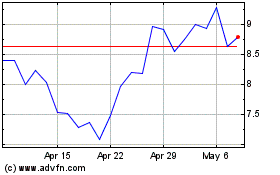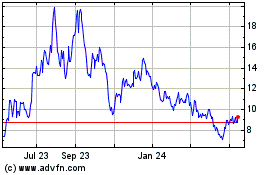IonQ Invents a Novel, Low-Overhead Approach for Partial Quantum Error Correction
August 07 2024 - 8:00AM
Business Wire
Represents significant step towards error
correction, enabling faster, more accurate quantum applications
with near term computers
IonQ (NYSE: IONQ), a leader in the quantum computing industry,
today announced a new breakthrough towards running large
applications on near term quantum systems using partial error
correction. The technique is an order of magnitude more efficient
than the best error correction techniques known today.
In a recent paper, IonQ researchers describe a novel way to
reduce noise in some of the most common and noisy operations used
in quantum applications, called Clifford gates. The partial error
correction scheme known as Clifford Noise Reduction (CliNR) uses a
modest 3:1 qubit overhead, compared to other techniques that
require tens, hundreds or even thousands of qubits for error
correction.
“This cutting edge innovation on error correction led by IonQ’s
research team offers the potential to supercharge the accuracy of
near-term quantum computers, bringing us much closer to commercial
advantage,” said Peter Chapman, President & CEO, IonQ. “The
achievement represents a significant step forward in IonQ’s efforts
to deliver on performance, scale, and enterprise-grade solutions to
solve customers’ most complex problems with our quantum
systems.”
Error correction–the practice of using many physical qubits to
constitute a more accurate logical qubit–is an important milestone
for quantum computing, but one that is believed to be several years
away given the large overhead of qubits and quantum gate operations
required to achieve it. Currently, IonQ’s high fidelity trapped-ion
qubits enable error correction overhead ratios as low as 13:1, but
even these ratios consume too many qubits to be practically useful
today.
IonQ is also a leader in error mitigation, a technique that uses
software to reduce errors in quantum applications. Error mitigation
is commonly used by quantum computing companies, but has drawbacks
at scale as it requires many data samples for implementation,
increasing the time to solution.
The CliNR technique offers an exciting alternative to full error
correction and error mitigation, balancing qubit count and time to
solution. It employs an efficient overhead of three physical qubits
for each error-corrected qubit and requires only a modest increase
in quantum gates to calculate a more accurate solution. Results
simulated using the CliNR technique demonstrated a substantial
fidelity improvement when compared to applications run without
error reduction techniques, and were suitable for applications
using up to 85 qubits.
Partial error correction could be a critical driver in achieving
exponentially deeper quantum circuits to run increasingly complex
algorithms for customers. IonQ plans to begin offering partial
error correction as a feature on its forthcoming IonQ Tempo system
generation.
The invention of the CliNR technique is the latest in a series
of technical and applications advances pioneered by IonQ’s
world-class research team. In March, IonQ and Deutsches
Elektronen-Synchrotron (DESY) announced initial results from its
study of initial results of their work to use quantum computers to
optimize flight gate assignments at busy airports. In June, IonQ
launched an accelerated technical roadmap focused on delivering
quantum systems with superior performance, scalability, and
enterprise readiness.
To learn more about IonQ’s research or how you can start using
an IonQ system today, please contact us directly at:
https://ionq.com/get-ready.
About IonQ
IonQ, Inc. is a leader in quantum computing that delivers
high-performance systems to solve the world’s largest and most
complex commercial and research use cases. IonQ’s current
generation quantum computer, IonQ Forte, is the latest in a line of
cutting-edge systems, boasting 36 algorithmic qubits. The company’s
innovative technology and rapid growth were recognized in Fast
Company’s 2023 Next Big Things in Tech List and Deloitte’s 2023
Technology Fast 500™ List, respectively. Available through all
major cloud providers, IonQ is making quantum computing more
accessible and impactful than ever before. Learn more at
IonQ.com.
IonQ Forward-Looking Statements
This press release contains certain forward-looking statements
within the meaning of Section 27A of the Securities Act of 1933, as
amended, and Section 21E of the Securities Exchange Act of 1934, as
amended. Some of the forward-looking statements can be identified
by the use of forward-looking words. Statements that are not
historical in nature, including the words “can,” “could,” “future,”
“near term,” “potential,” “promising,” “will,” and other similar
expressions are intended to identify forward-looking statements.
These statements include those related to the company’s technology
driving commercial quantum advantage in the future, the ability for
third parties to implement IonQ’s offerings to increase accuracy,
performance, and their quantum computing capabilities, the effect
of increased availability of customer support functions, IonQ’s
quantum computing capabilities and plans, availability of access to
IonQ’s quantum computers, increases in algorithmic qubit
achievement, the scalability and reliability of IonQ’s quantum
computing offerings, the potential effectiveness of error
correction techniques and reducing noise, and the potential for
implementing scalable fault-tolerant schemes. Forward-looking
statements are predictions, projections and other statements about
future events that are based on current expectations and
assumptions and, as a result, are subject to risks and
uncertainties. Many factors could cause actual future events to
differ materially from the forward-looking statements in this press
release, including but not limited to: changes in the competitive
industries in which IonQ operates, including development of
competing technologies; changes in laws and regulations affecting
IonQ’s business; IonQ’s ability to implement its business plans,
forecasts and other expectations, identify and realize partnerships
and opportunities, and to engage new and existing customers; IonQ’s
ability to implement or integrate the technology into existing or
future solutions; IonQ’s ability to utilize error correction
techniques to improve quantum applications. You should carefully
consider the foregoing factors and the other risks and
uncertainties disclosed in the Company’s filings, including but not
limited to those described in the “Risk Factors'' section of IonQ’s
most recent Quarterly Report on Form 10-Q and other documents filed
by IonQ from time to time with the Securities and Exchange
Commission. These filings identify and address other important
risks and uncertainties that could cause actual events and results
to differ materially from those contained in the forward-looking
statements. Forward-looking statements speak only as of the date
they are made. Readers are cautioned not to put undue reliance on
forward-looking statements, and IonQ assumes no obligation and does
not intend to update or revise these forward-looking statements,
whether as a result of new information, future events, or
otherwise. IonQ does not give any assurance that it will achieve
its expectations.
View source
version on businesswire.com: https://www.businesswire.com/news/home/20240807147133/en/
IonQ Media contact: Tyler Ogoshi press@ionq.com
IonQ Investor Contact: investors@ionq.com
IonQ (NYSE:IONQ)
Historical Stock Chart
From Oct 2024 to Nov 2024

IonQ (NYSE:IONQ)
Historical Stock Chart
From Nov 2023 to Nov 2024
